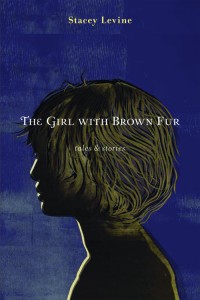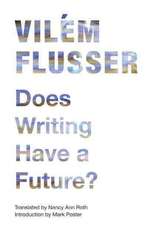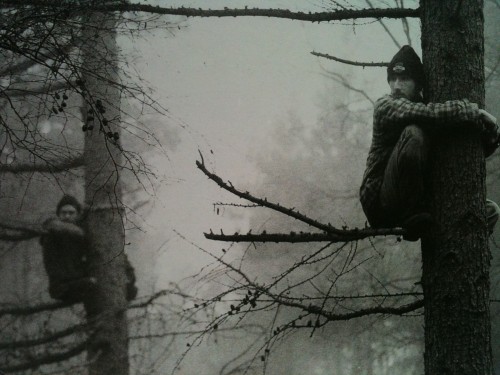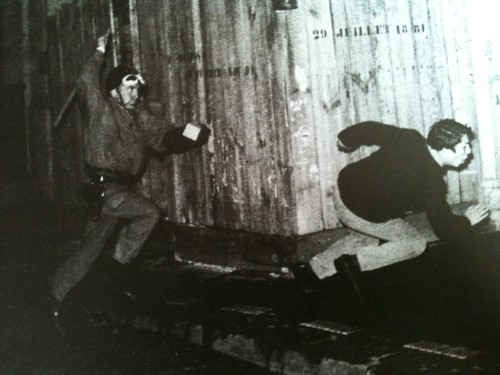The Girl with Brown Fur by Stacey Levine
 Couched within the strange fables in Stacey Levine’s latest story collection The Girl with Brown Fur are recognizable hurts and self-defeating desires. The way she writes about such things is what makes her fiction the elegant, precise and transcendent wonderland it is. For instance, in the story “The Girl,” the narrator sees a young girl on a leash in the hallway of a hotel, and determines to steal her. As we enter the mind of a child-abductor, we register the obsessive thinking, the cagey strategizing – it’s distasteful, ominous. Then a chance remarks reveals the narrator is a woman, one who has always nursed “the wish to transform into someone else, a different kind of body, to find another story in which to live.” Clearly she is appropriating the girl as way to do this, and the urge is as uneasily recognizable as it is licentious. The story plays with power dynamics in a new way – the animalistic qualities the narrator projects onto the girl (the one with brown fur) make a subtle point about exploitation but also tilt the story into poetry.
Couched within the strange fables in Stacey Levine’s latest story collection The Girl with Brown Fur are recognizable hurts and self-defeating desires. The way she writes about such things is what makes her fiction the elegant, precise and transcendent wonderland it is. For instance, in the story “The Girl,” the narrator sees a young girl on a leash in the hallway of a hotel, and determines to steal her. As we enter the mind of a child-abductor, we register the obsessive thinking, the cagey strategizing – it’s distasteful, ominous. Then a chance remarks reveals the narrator is a woman, one who has always nursed “the wish to transform into someone else, a different kind of body, to find another story in which to live.” Clearly she is appropriating the girl as way to do this, and the urge is as uneasily recognizable as it is licentious. The story plays with power dynamics in a new way – the animalistic qualities the narrator projects onto the girl (the one with brown fur) make a subtle point about exploitation but also tilt the story into poetry.
This is Levine’s genius – to make her points allusively, in an allegorical code, one that nevertheless always feels down-to-earth and revealing of very real pockets in the human psyche. In an interview included with the press package of her new collection, she says: “It wouldn’t mean anything to say outright: ‘He was feeling really anxious because he had always been criticized by his father.’ But it does mean something for me to tell how that would feel, to try to share that experience in a new way.” The technique she has developed for doing this leads her into sometimes surreal and hilarious allegories – about mass production work in a sausage factory (“Sausage”), for example, or a brother and sister who marry each other, with their parents’ approval, and incite wrath only when they want to move out of the family house.
May 12th, 2011 / 5:49 pm
linen lines, or, a meaningless line of letters
Etymologically, the word text means a textile and the word line a linen thread. But texts are unfinished textiles: they consist of lines (the woof) and are not held in place by vertical threads (the warp) as a finished textile would be. Literature (the universe of texts) is half finished. It seeks completion. Literature is directed toward a receiver, from whom it demands completion. The writer weaves threads that are to be picked up the receiver to be woven in. Only then does the text achieve a meaning. A text has as many meanings as it has readers.
The well-known phrase habent [sua] fata libelli (books have destinies) gives only a rough idea of what is meant here. It is not that the writer transmits powers to his texts so that the text can put those powers into play according to its particular dynamics; it is that the text goes out to be completed. So the text does not have a destiny; it is a destiny. In other words, the text is meaningful, and this fullness can only be exploited (explained) by each of its readers in a particular way. The greater the number of ways a text can be read, the more meaningful it is. Aristotelian texts are meaningful because they have meant something to Alexandrian readers different from what they meant to Thomas Aquinas, Hegel, Galileo, or twentieth-century historians. A text meets its fate (the message that it is) in its receiver. Texts without receivers, unread texts, are meaningless lines of letters that take on meaning only when they are read.
At the A.N.D Project, a compelling collagelike interview with philosopher Richard Kearney & academic economist David Galenson about the nature of imagination and dual-creativity: “Imagination needs to be nourished by contact with what is other than itself and then, when it assimilates and digests and incorporates and incarnates with something other than itself, there’s always something other.”
An Evening of Poetry at the White House
If you’re wondering what Kenneth Goldsmith ended up doing when he read at the White House, here’s the video (he’s at 8:55).
Six Items of Interest

Jennifer Egan commented on the reaction to her comments during a WSJ interview where she implied that certain books were “derivative, banal stuff”. I thought her response was fantastic:
It was, she said, exactly the kind of thoughtlessly casual remark that, with her journalistic background, she should have known better than to say in conversation with a reporter—but which may now linger on the Internet and continue to be seen as her position on the subject. “I have nothing to defend in what I said,” she said. “I really wish I hadn’t said that, and was incredibly and immediately sorry that anyone was hurt by it. I don’t blame anyone for being mad about it.” Though she does believe there’s an interesting conversation to be had about genre and gender and literary culture, she doesn’t see her comments in that interview as any kind of effective contribution to that discussion. “I’m all for criticizing; I’m not saying that no one should ever criticize anyone else,” she continued. “But if you’re going to criticize, you should do it intentionally and thoughtfully and carefully and know whom you’re criticizing and for what. And I didn’t meet any of those criteria.” (Thanks for the link, Cathy Day.)

Interview of a Librarian
Last week I had a slight buzz and randomly phoned 10 public libraries in 10 random states and asked to talk to a librarian. I asked the librarian if they would give me an email interview. Two hung up directly after the question. One woman coughed, and I heard her ask someone a question, and then she hung up. One said, “Quit calling me, Steven.” My name is not Steven. Six graciously said yes, and gave me their email addresses. Then, of the six, only one responded in full to the email interview questions. I have no idea why. These answers are from B. David. He manages a library in Mississippi.
The library seems to be one of the last places in America where no one tries to sell you anything. You can just hang out. Do you have an opinion on the library as a public space?
Absolutely. One of the great things about the library is that it is a place you can go and your privacy is yours. You can read what you want, learn about what you want, talk about what you want and know that your freedoms are not being tampered with. We hold these kind of rights pretty high. One thing that really scared the bejesus out of us library’s was the Patriot Act. The Patriot Act was basically trying to compel libraries to give up information about their patrons while at the same time preventing us from telling the patrons that this was going on. The libraries countered by deleting all patrons loan records so that there was nothing there for the government to look at. What does this have to do with public space? A public space is just that: a place where the public can gather and express their mind and their views. Most libraries come equipped with meeting rooms for this exact reason. Unless you are trying to sell something, or hold a closed meeting, we will allow most anyone to come in and use our room to peddle their silly views.
Does your library have a glory hole?
“Cape” by Kim Chinquee
 Last night, I dreamed that I was in a clearing in a forest, and my wife was below me, yelling that I should fly higher to avoid danger. It was nighttime, there were some stars. I felt scared as I rose, but then I felt very happy, because my wife joined me over the forest, and we escaped along the mountain ridges.
Last night, I dreamed that I was in a clearing in a forest, and my wife was below me, yelling that I should fly higher to avoid danger. It was nighttime, there were some stars. I felt scared as I rose, but then I felt very happy, because my wife joined me over the forest, and we escaped along the mountain ridges.
It is a dream I have not had in so long. It is the kind of dream that I’ve missed having, one that I had so many times before when I was a young boy. Most of you have probably had this dream as well: the flying dream. Yes, when I was little, I often dreamed that I could fly. In my dream, I floated out of my room, down the stairs to the landing at the front door of our house, and outside.
Elliot Feels His Feelings: an interview with Michael Kimball

Michael Kimball is now the author of three of my favorite books. Before I read his latest, US, I had read and loved THE WAY THE FAMILY GOT AWAY. Before I read US, I read and really, really loved DEAR EVERYBODY. And before I read US, I had purchased but had not yet gotten to HOW MUCH OF US THERE WAS.
Now there’s US: disarmingly simple, gorgeously structured, and as achingly sad a book as I have ever read. I had to stop a couple of times. I really did. The book’s elderly couple—so painfully aware of the fact that one of them is living the last parts of her life—are drawn so concisely, and the situation is so precisely rendered, it was hard not to spend all my time living in it even when I wasn’t reading the book.
Michael and I talked about DEAR EVERYBODY when it came out. When US appeared, we thought it might be nice to talk again.
***
Started your book last night. You are going to break my heart again, aren’t you?
Yes, but in a different way.
Why do our hearts have to break in so many different ways?
It’s one of the surprising things about life, right? When we learn that that can happen.
Or,
I think that it’s partly a structural issue, the heart’s strange shape. READ MORE >




